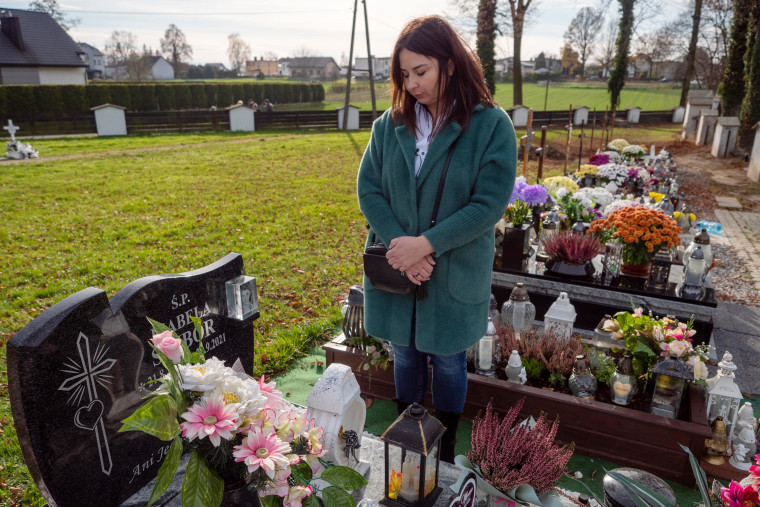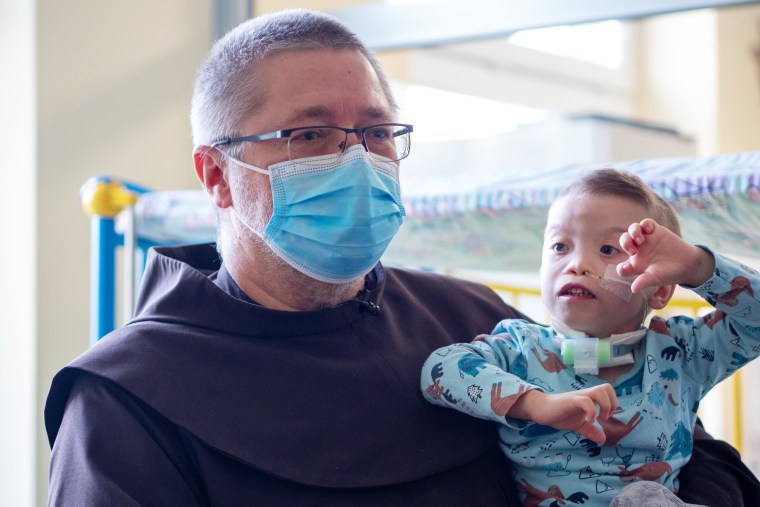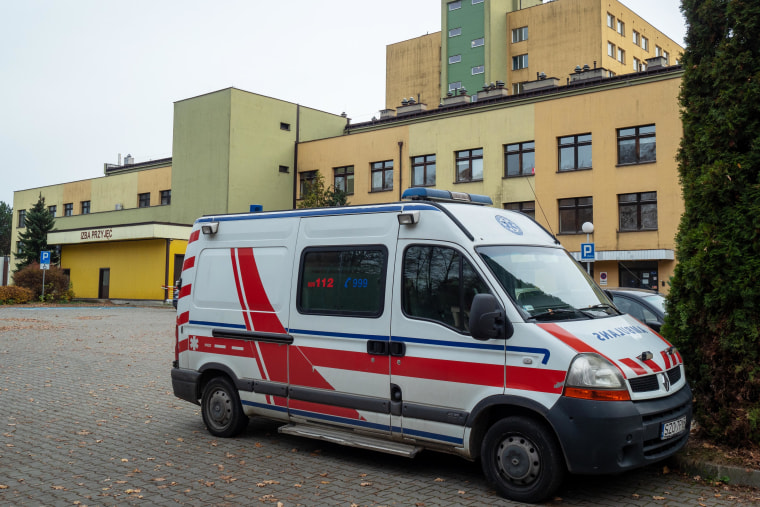[ad_1]
WARSAW, Poland — Standing in a near-empty rural cemetery, Barbara Skrobol braced against the cold and a potential confrontation: The local priest, she said, doesn’t like the journalists and activists she regularly parades past her sister-in-law’s grave.
“She just wanted to live,” Skrobol said of her brother’s wife, Izabela Sajbor, who died last year from sepsis at the age of 30. An abortion could have saved her life, she said. “We blame not only the doctors because they made a mistake, but we blame the politicians who implemented this law.”
Poland’s strict anti-abortion laws had already set the country apart from its European neighbors. But a court decision last year tightened them further, at a time when even the traditionally conservative Catholic countries like Ireland, Argentina, Uruguay and Chile are embracing abortion rights.

The laws have also exposed a political kinship between Poland and the United States — two nations where a powerful religious right-wing has resorted to courts, rather than legislatures, to impose some of the most restrictive abortion laws in the developed world.
“The main similarity, and the reason that it’s so politicized in both countries, is that you have a religious right in both America and in Poland,” said Aleks Szczerbiak, a professor of politics at the University of Sussex in the United Kingdom. “Abortion is not an issue in countries like France and Italy because the core of the right, even the radical right, is not rooted in moral,cultural or religious politics in the way it is in Poland and arguably in the United States.”
Most of Poland’s anti-abortion activists tend to be people of faith who use secular rhetoric to argue that abortion is tantamount to murder.
“At 14 weeks, there’s already a heart beating, there is a nervous system,” said Filip Buczynski, a Franciscan monk, anti-abortion activist and the founder of a hospice for terminally ill children and infants. “I wouldn’t consider it religious law. It’s just human law and that there is a human being, and this is the main issue.”
Abortion has been illegal in Poland — except for cases of rape, incest or risk to the mother’s life — since 1993. That’s when Catholic activists, who were widely lauded for their crucial role in the defeat of communism, spent some of their accumulated public goodwill to score a significant culture war win.

The law is so restrictive that even rape victims seeking a legal abortion are obliged to secure a certificate from a prosecutor, a process that takes time and requires public exposure in sensitive cases.
That law created a kind of geographic role reversal. Under communism, Poland had been a destination for women seeking abortions from more conservative Western European countries where it had been illegal. Now, it’s Polish women who have to step over the fallen Iron Curtain to seek abortions in the more liberal West.
Thanks in part to that unpopular memory of communism, Poland’s right-wing Law and Justice party has enjoyed immense political power since its founding at the beginning of the century.
By October 2020, a year before Sajbor’s death, the party had stacked Poland’s high constitutional court with conservative justices. In a ruling that sparked protests across the country, the court tightened anti-abortion rules even more, banning terminations in the case of fetal abnormalities, which had been among the only legal routes to an abortion.
The ruling worked: Almost overnight, the number of legal abortions in Poland decreased by 90%, according to abortion rights advocacy groups.

Like women living in anti-abortion U.S. states, Poles can travel to seek an abortion. Polish women still undergo an estimated 150,000 abortions each year. About 90% of these are done abroad, or with abortion pills normally delivered by mail, according to Krystyna Kacpura, the executive director of Poland’s Federation for Women and Family Planning.
But foreign travel is prohibitively expensive for the vast majority of Polish women, many of whom do not speak another language to help them navigate foreign health systems.
“It causes reproductive injustice, because women with money, educated, working in big towns, they have access to information and they can easily go abroad and have access to all reproductive health services,” Kacpura said. “But for the majority of women, it’s not accessible.”
With her wealth and stability, Sajbor had been among the lucky ones.
When she found out that her son would be born with a terminal genetic condition, she considered traveling to Western Europe for an abortion. The previous year’s court ruling had made the prospect of a legal abortion on medical grounds impossible.
But before she could make the trip, Sajbor went into premature labor. Spooked by the previous year’s court ruling, her family says, doctors refused to perform a potentially lifesaving abortion until they could be sure the fetus was already dead.
“My life is in danger” Sajbor said in texts to her mother in the frantic hours before she died that were seen by NBC News. “They cannot help as long as the fetus is alive thanks to the anti-abortion law.”
What happened next remains unclear — Covid restrictions meant Sajbor’s immediate family couldn’t be with her. But according to Sajbor’s own text messages, the doctors delayed performing a cesarean section despite her worsening fever and chills.

Among Sajbor’s final texts: “A woman is like an incubator,” she wrote. By the time doctors finally acted, it was too late.
Sajbor’s death sparked another round of massive protests in Poland.
Last November, two months after her death, the hospital said in a statement that the “only premise guiding the medical procedure was concern for the health and life of the patient and the fetus.”
It added: “Doctors did everything in their power, they fought a difficult fight for the patient and her child. The entire medical procedure is subject to prosecutorial assessment and no sentences can be passed at the moment. We very much hope that a diligent and honest prosecution will allow us to identify the causes of death of the patient and her child.”
Three doctors have since been criminally charged with “exposure to danger of loss of life” over their involvement in the incident. Two of them also face “involuntary manslaughter” charges, which could have penalties of up to five years in prison. They have not entered pleas.
Two of the doctors were suspended from work at the hospital, but they have since returned, according to a statement from the hospital.
Skrobol is refusing to let go of the issue. Beneath her sister-in-law’s name on her headstone, the family has etched the words “Not One More” — a slogan that’s been widely used by protesters and Poland’s abortion rights movement.
That’s effectively turned the modest grave into a permanent political monument — honoring the latest casualty in a culture war that now straddles continents.
[ad_2]
Source link
